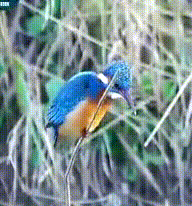PANORAMIC HUNTING
Parent Page : Our Future World
 A kingfisher looks at the water where the fishes are, he doesn't look at the trees. Predatory animals watch over a limited pahanal area, and then look for specific changes within this area.
A kingfisher looks at the water where the fishes are, he doesn't look at the trees. Predatory animals watch over a limited pahanal area, and then look for specific changes within this area.
This combination is motivated and governed by focused intention.
For further practical examples see Predatory Sensing.
The First Step
The first step humans need is pure pahanal sensing – otherwise any combination will be a secondary veneer of not very intensive pahanal sensing on top of our basic habitual focusing.In practice, if first they don't learn how to watch out for danger, every young predatory animal would end up as food.
Pahanal Hunting
Pahanal hunting is a fascinating subject, but it's dominated by focusing. It stimulates thinking and wanting but on a different level.By combining the two ways of sensing, we can do lots of clever things.
There is great potential in this approach to life and it's a fascinating subject, but it's complex and dangerous. The danger is because it's so very clever, it has a glamour and superiority which will inevitably be attractive to some people.
But our culture doesn't need anymore cleverness and complications.
In addition, even with rational logical reasoning, the ability to pahan in its purest safest form, is indispensable to learn separately and first, before any realistic combination can be made.
I haven't ever really started experimenting with pahanal hunting, at present it seems irrelevant. Pure pahaning is my interest. Pahanal hunting is dominated by active desire. It doesn't encourage peace of mind, unity, safety, and all the other elementary essentials which are missing from modern civilised life.
The pure method is far easier to learn and start using.
Clever Examples
Part of the panoramic state of mind is being able to trust our subconscious mind to come up with the right idea at the right time, not having a to-do list – trusting that the right idea comes next.So, it's similar to what writers do when they're looking for a word, or musicians waiting for the next notes. I believe this is only rarely combined with a panoramic awareness of the environment, but as part of the creative process it's natural to just hover in a mental emptiness and wait for a few seconds.
I have often used a similar method while writing this. The difference is i spend a few moments actively receptive to my environment. Waiting for nothing in particular. And so the next idea ocurrs.
The walking exercise, looking a little above the horizon when moving through a busy crowd, is a good practical example of superior powers. If you're relatively tall, it gives you a good overview of general movements and find amazing ways to weave through the crowd.
Dreams, intuition, and creative inspiration are the effects of a combination of pahanal and focused activity. This is outside the scope of these essays, but the idea is worth considering as a general psychological starting point.
How motorists combine focusing and pahaning enables us to do something 'clever', but it's not really a good example of the possibilities of pahanal hunting. Motorists only use their pahanal senses subliminally, they must focus on where they are going, the road ahead, other drivers, multiple signals and mirrors.
Advanced Martial Arts combine both forms of sensing in a potentially magnificient way. But it takes years to learn, needs devotion and endless hours of daily practice. Again, it has so many egoistical side tracks and lacks all the elementary essentials which are missing from modern life.
Related Page : Predatory Sensing
Back to Chapter Three : Civilisation's Habitual Ruts
Back to THE PANORAMA SENSES Priority Pages